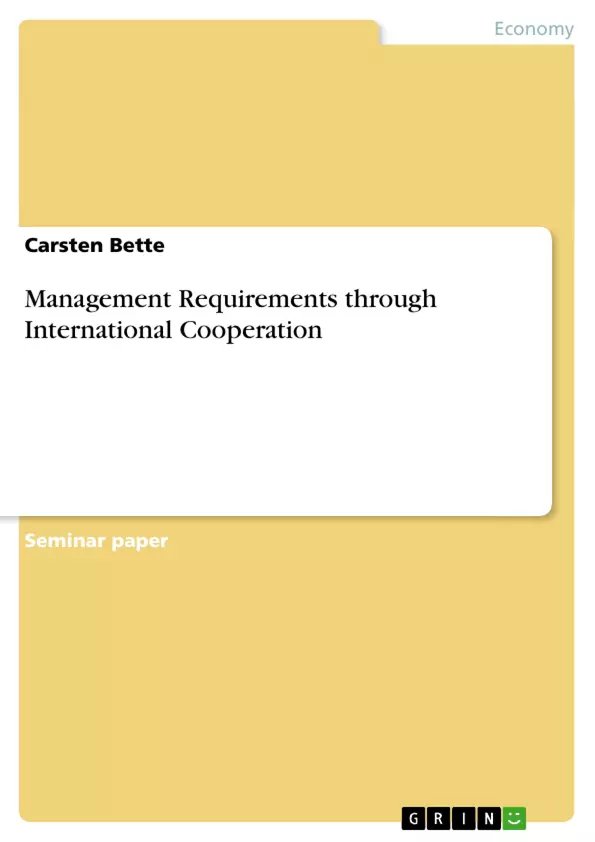Internationalization is an omnipresent phenomenon in our world today. No one thinks explicitly about internationalization when one buys a book at Amazon or goes to Mc Donald’s for lunch. These are only two examples for big multinational companies which are doing business worldwide. International trade and cross-border business connections have quite a long history. The first large trade network was the Hanseatic League in the Middle Ages which was located in North and Middle Europe. Now there are even bigger communities like the EU or the NAFTA.1 Beside these there are also political institutions like the OECD2, the World Bank or the World Trade Orga nisation (WTO) which influence and support worldwide business activities. But what does the term “international management” mean and why becomes it more and more important for us? Management characterize the control and coordination activities concerning goal-oriented organizations.3 These activities occur in the first place in the domestic business of companies. But much more complex is the management in international business which is defined as “ the study of transactions taking place across national borders for the purpose of satisfying the needs of individuals and organizations.”4
---------
1 North American Free Trade Agreement, foundet in 1994 by Canada, Mexiko and the USA
2 Organisation for Economic Co-operation and Development
3 Thomae (2002), p.17
4 Rugman/ Hodgetts (1995), p.4
Inhaltsverzeichnis (Table of Contents)
- The relevance of international management in the context of globalization
- Basics of international cooperations and factors of influence in international relationships
- Definitions and forms of international cooperations
- Cultural influences on international cooperations: Definition of culture and classification by Hofstede
- The importance of trust and communication between cooperation partners
- Management requirements regarding the central management processes of international cooperations
- The role of global managers: Skills and competencies
- Planning, negotiating and controlling in an international business context
- The Integration-Responsiveness-Framework of Bartlett/ Goshal as an organizational strategy
- Global leadership behavior in international cooperations
- The importance of cultural awareness in the management of international cooperations
Zielsetzung und Themenschwerpunkte (Objectives and Key Themes)
The main objective of this paper is to explore the management requirements involved in international cooperation within the context of globalization. It seeks to analyze the different forms, goals, and risks associated with international cooperation, as well as the influence of “soft factors” such as culture, trust, and communication on international management. The paper also aims to examine how these factors impact the management processes within international cooperations, highlighting the specific skills and competencies required for global managers.
- The importance of international management in a globalized world
- Different forms, goals, and risks of international cooperation
- The role of culture, trust, and communication in international management
- Management requirements for effective international cooperation
- The significance of cultural awareness in international business settings
Zusammenfassung der Kapitel (Chapter Summaries)
The first chapter of the paper discusses the relevance of international management in the context of globalization, highlighting the growing importance of cross-border business activities and the need for effective management strategies in a globalized world. The second chapter examines the different forms, goals, and risks of international cooperation, with a particular focus on the influence of culture, trust, and communication on successful cooperation. The third chapter explores the specific management requirements involved in international cooperations, including the skills and competencies needed by global managers, the impact of planning, negotiating, and controlling in an international business context, and the application of the Integration-Responsiveness-Framework of Bartlett/ Goshal as an organizational strategy. The fourth chapter emphasizes the crucial role of cultural awareness in the successful management of international cooperations.
Schlüsselwörter (Keywords)
The main keywords and focus topics of this paper include: international management, globalization, international cooperation, culture, trust, communication, management requirements, global managers, planning, negotiation, control, Integration-Responsiveness-Framework, and cultural awareness.
Frequently Asked Questions
What is the definition of international management in this paper?
International management is defined as the study of transactions taking place across national borders to satisfy the needs of individuals and organizations, involving complex control and coordination activities.
Why is cultural awareness important for global managers?
Cultural awareness is crucial because soft factors like culture, trust, and communication significantly influence the success of international cooperations and management processes.
What is the Integration-Responsiveness-Framework?
Developed by Bartlett and Ghoshal, it is an organizational strategy used to manage the balance between global integration and local responsiveness in international business.
How does Hofstede’s model apply to international cooperation?
Hofstede’s classification of cultural dimensions helps managers understand and navigate cultural differences between cooperation partners from different nations.
What skills are required for effective global leadership?
Global managers need a mix of strategic planning, negotiating skills, intercultural competence, and the ability to build trust across borders.
- Quote paper
- Carsten Bette (Author), 2004, Management Requirements through International Cooperation, Munich, GRIN Verlag, https://www.grin.com/document/28185



